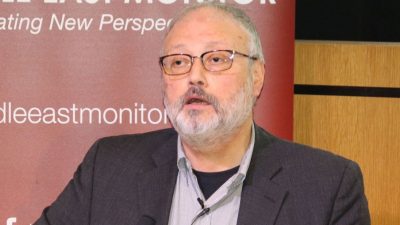Embassy Disappearances: Jamal Khashoggi and the Foreign Policy Web

“Do this outside. You will put me into trouble.” — Mohammad al-Otaibi, Saudi consul, to Saudi agents, Istanbul, October 2, 2018
It smells, but anything wedged between the putrefaction of Saudi foreign policy, the ambition of Turkish bellicosity, and the US muddling middleman is bound to. Three powers tussling over image and appearance; all engaged in a wrestle over how best to seem the least hypocritical. US-based Saudi journalist Jamal Khashoggi already seems to have found his name into the books of martyred dissidents, but we have no body, merely an inflicted disappearance suggesting a gruesome murder.
The journalist, a notable critic of Saudi Crown Prince Mohammed bin Salman, was last seen on October 2 entering the residence of the Saudi consul-general in Istanbul, ostensibly to obtain a document necessary for his upcoming nuptials. A senior Turkish official put forth a brutal scenario on Wednesday based on obtained audio recordings. Saudi operatives, probably numbering 15 from the intelligence services and the Royal Guards, were waiting for Khashoggi’s arrival at 1.15 pm. Within a matter of minutes, Khashoggi was dead, decapitated, dismembered, his fingers removed. The entire operation took two hours.
The New York Times pondered how the brutality was inflicted. “Whether Mr. Khashoggi was killed before his fingers were removed and his body dismembered could not be determined.” The Saudi consul Mohammad al-Otaibi was revealed to be squeamish and worried, suggesting the agents ply their craft elsewhere. The reply from one of the company was curt and unequivocal: “If you want to live when you come back to Arabia, shut up.” A Saudi doctor of forensics, Salah Muhammad al-Tubaigy, a worthy addition to the crew, got to work disposing of the body. His advice to any companions feeling wobbly: listen to music, soothe the savage breast.
A danse macabre has developed between the various power players. US president Donald Trump has asked his Turkish counterparts for any audio or video evidence that might shed light on the journalist’s fate. To date, these have been drip fed with tantalising timing, disturbing the White House’s neat and comfortable acceptance of the account put forth by Riyadh. But Turkey’s Recep Tayyip Erdoğan, an individual never shy to exploit a jingoistic moment, has remained cautiously reticent.
This is where the world of image, supposition, and make-believe, comes into play. The procuring of evidence is being resisted. Trump asks, but does not expect any. The Turkish side, thus far, supplies crumbs, finding their way into selected news outlets such as the Daily Yeni Şafak. Trump, for his part, remains non-committal, even indifferent to what might emerge. “I’m not sure yet that it exists, probably does, probably does.”
The picture is patchy, gathered from audio surveillance, intercepted communications and a miscellany of sources, but on this point, Ankara remains ginger. US intelligence officials have so far suggested that circumstantial evidence on the involvement of Crown Prince Mohammed is growing.
Trump’s game with the Kingdom of Saudi Arabia is one of hedging and hoping: hedging on the issue of blood-linked complicity, and hoping that the sordid matter will simply evaporate in the ether of the next event. “I just want to find out what’s happening,” he deflected. “I’m not giving cover at all.” But he has again fallen victim to the characteristic, off colour corker: allegations against the Saudis might be analogously seen with those of sexual assault against now confirmed Supreme Court Justice Brett Kavanaugh. “Here we go again with, you know, you’re guilty until proven innocent. I don’t like that. We just went through that with Justice Kavanaugh and he was innocent all the way as far as I’m concerned.” US Secretary of State Mike Pompeo has also shown a marked reluctance to go near any details, telling the press that any facts on Khashoggi will not be discussed.
Politicians in the United States have been attempting to add tears and remorse to the equation, though these dry quickly. Rep. Eric Swalwell Jr. from California suggested that the explanations were needless. “If someone was killed in your home, while you were in it, and 15 days later you’re still coming up with an explanation… forget it. We already know.” US Rep. Paul Ryan and Senator Orrin Hatch are chewing over the prospect that Khashoggi’s fate might have been occasioned by an “interrogation gone wrong”.
The one person to again blow the cover off any niceties, to destroy the façade of propriety in what is otherwise a grizzly affair is the US president. He has avoided funereal respects and regrets. He has avoided referencing any idyllic notions of a free press. The all-powerful dollar and arms sales remain paramount. “You’ve got $100 billion worth of arms sales… we cannot alienate our biggest player in the Middle East.” And just to show that a love of God and the foetus won’t deter evangelicals from embracing a ghoulish Arab theocracy, Pat Robertson has added his hearty support. “For those who are screaming blood for the Saudis – look, these people are our allies.”
Whatever happens regarding Khashoggi, the relationship between Washington and Riyadh is assured. Turkey, from first signs, is avoiding open confrontation. Murder, alleged or otherwise, can take place in certain circumstances, however brazenly executed. The brutality against Khashoggi, should it ever come to be properly aired, is but another footnote in the program of a kingdom indifferent to suffering, from the saw doctor to the jet. And business remains business.
*
Note to readers: please click the share buttons above. Forward this article to your email lists. Crosspost on your blog site, internet forums. etc.
Dr. Binoy Kampmark was a Commonwealth Scholar at Selwyn College, Cambridge. He lectures at RMIT University, Melbourne. He is a frequent contributor to Global Research and Asia-Pacific Research. Email: [email protected]

